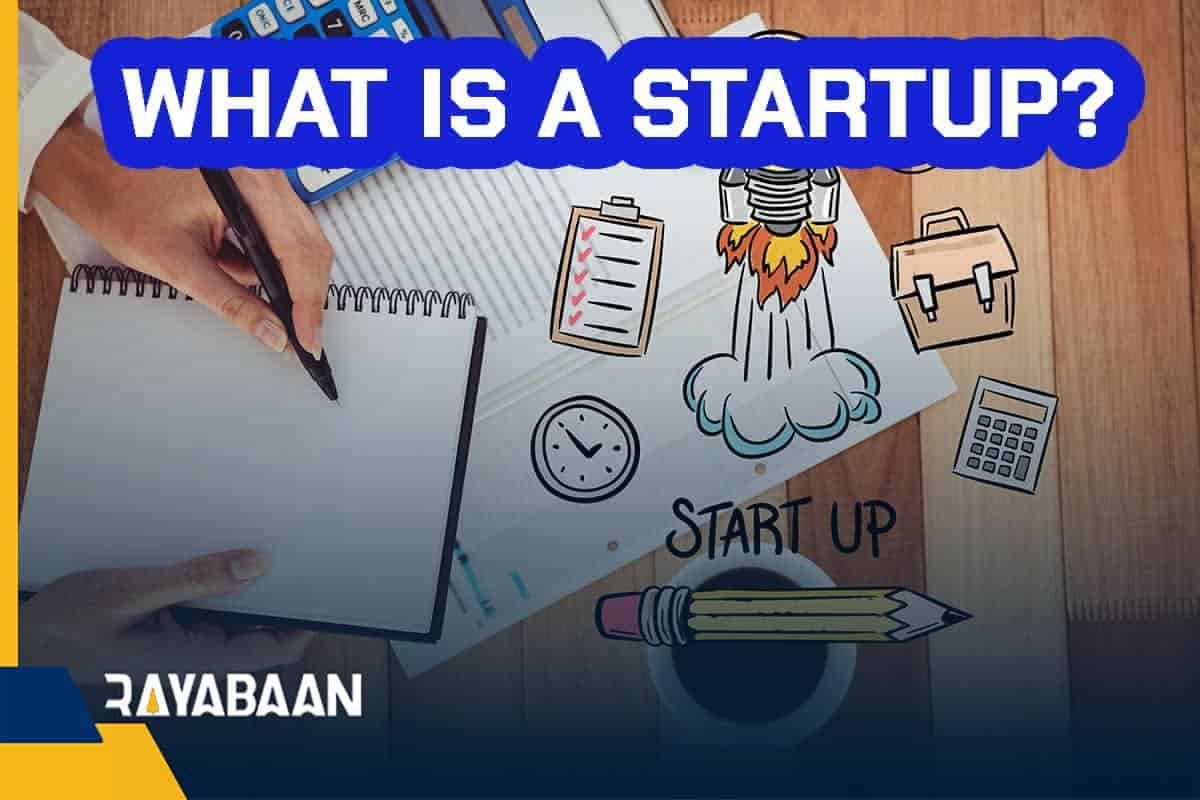What is a startup? Untold secrets
In this article, we examine the concept of a startup(What is a startup?) in a more detailed and accurate way and introduce some terms such as startup ideas, startup history, the difference between a startup and traditional businesses, and so on.
These days, you may have heard in different circles about start-ups and new businesses that have turned from small offices into large global organizations after a while, and you have even thought that you too can bring your idea to reach such a position.
There are many materials available about the meaning and definition of a startup. One of the best definitions of a startup that has ever been given is by Eric Ries, the founder of the Lean entrepreneurship method:
A start-up is a human institution that was created to create a new product, service, or value.
Also, Steve Blank, one of the prominent theorists in the field of business, expresses the meaning of startup as follows:
A startup is a temporary organization set up to search for its business model; A business model that is repeatable and scalable.
Regarding the most important feature of startup companies, you should keep in mind that these innovative and creative companies have the advantage of obtaining very high productivity results. So that after some time, spending time, and fixed costs, they increasingly respond to the demand of their users or customers through service provision.
Keep reading to learn everything you need to know about startups.
Why should I read this text?!
Maybe you are part of a group of people who have an idea and want to make it happen; But before you want to rent an office and buy a few laptops and printers for yourself, we recommend that we review the definition and meaning of a startup and some of the principles of starting a startup together!

What is a startup?
Various websites and internet resources have defined the concept of the startup and the principles and basics related to it, and with just a simple internet search on some of these sites, you can get various definitions of it.
Of course, there are mistakes in these definitions, which are not discussed in this article.
In general, start-up refers to projects in which a raw idea, with the help of a group’s efforts, leads to the production of a product, and the basis for the sale of that product is provided.
The startup goes all the way from zero to one hundred and performs all the steps by trial and error or learning its basic principles.
Now, the start of the startup concept may be a very complex scientific work such as a hard invention in the software field, or a market group may decide to change a very simple product and prepare the ground for its entry into the market as a new product.
So it is necessary to repeat, successful startup ideas or successful global startups do not necessarily work on complex scientific tasks; Rather, they are more successful than others in producing a product and selling it to the customer.
Startup History
If we want to look at the history of startups, it can certainly be tied to the beginning of civilization among humans and the buying and selling of various products.
But the start of using the startup concept dates back to around 1911 when they started with Silicon Valley companies.
One of the most important products of this company was the start-up IBM, whose name is derived from International Business Machines. In the following years, this startup managed to introduce itself as one of the giants of software products in the world.
Another one of the oldest and most successful startups in the world is Apple, which was launched by Steve Jobs, and you all are familiar with the way this person came to be and how hard he struggled to achieve this startup.
But another famous start-up in the world that we are all involved with is the Google start-up, whose idea came up in 1997 and started working and produced its product in 1998. Today, Google’s search engine can be introduced as the most complex and powerful search engine in the world.
Reading the article “How to find startup idea” is useful for you to find ideas for starting a startup.
Why is starting a startup attractive?
Maybe you have also wondered why most of those who want to start a business prefer to use the word and concept of startup for it.
We have to admit that this issue is more psychological and, of course, in some cases, government support for some companies makes them put this label on their business.
If we consider starting a startup as the beginning of a new business, the psychological aspect of this comes from the fact that all humans are looking for new challenges and to be seen.
When someone tries to produce a new and attractive product at the community level, the number of people who choose this product and consider it as their first choice determines the success rate of the startup.
Therefore, when a person takes a risk on a new work and comes to the conclusion in his imagination that the desired product will make it visible and even branded, he tries to present this work in different ways.
With these interpretations, concepts such as:
1. Freshness,
2. Being seen
3. Government privileges for start-ups,
4. Being unique,
5. Psychological aspects,
6. And the desire to achieve success from zero to one hundred,
They are the main reasons that most people tend to start a new business or start-up.
The difference between startups and traditional businesses
- Startups grow in stages
It is better to consider a startup as an onion that goes through its stages of growth step by step and reaches maturity. This is even though in traditional business, the capital of a new business is usually provided and the sales process begins immediately.
For example, if you produce a new shoe, market it, develop your customer base, and grow your business, you have strictly implemented the startup concept.
But if you rent a shop and put and sell shoes of different brands, you have used a traditional style.
- Startups are developed based on scientific principles
The important thing about startups is that their development is based on scientific principles and even their advertising and sales are done according to the scientific principles of the day.
So when your goal is to launch a startup, you need to learn new knowledge and develop it over time.
Meanwhile, in traditional business, you can learn all the work steps from your father or your teacher and immediately enter the job market.
Steps to launch a startup
According to the definitions and things that have been said about the concept of a startup, here we consider it necessary to introduce the steps of starting it step by step so that you can use it as a model for starting your own business. use.
Of course, some people may add a few other minor steps to these steps, which depends on people’s taste. But if you are planning to start a startup, you must follow the following steps strictly:
1. Ideation
The start-up concept starts with an idea, this idea may be creative and new or may be derived from a foreign or domestic business. For example, a new business is not always going to come to life based on an invention, perhaps a creative person can make a small change to a tea flask, attract customers’ attention to it and sell it as a product.
Therefore, the idea of a startup is not always supposed to be complex and heavy or require a lot of investment.
If you search the Internet for the word “best startup ideas“, you will probably come across many options, some of which seem ridiculous or impossible at first glance, but you will see that a group of hardworking young people has managed to make money from these ridiculous ideas. Now they are working in many parts of the world.
So never be afraid to come up with ideas in the field of entrepreneurship.
2. Research and determine the road map
The second step you need to take to realize your startup concept is to take a white paper and write a roadmap.
This is a rough sketch of your idea and its general direction, and you should specify in it what point you want to reach. As you have taken the first step with ideation, it is better to fantasize a little and push your goal as far as possible.
After the final goal is determined, it is time to break this path into several shorter paths and consider several short and long goals for yourself.
For example, if you plan to travel to another city, you should specify which villages or towns you will reach and what your purpose is there.
Next, you need to do your research. It’s good to have a raw idea, but it’s just as dangerous and can derail you. The research includes various reviews about the product as well as customer acceptance of this product.
The best place to start your research is to ask your family and friends to comment on your idea and point out if there are any problems along the way.
3. Registration of ideas and ownership claims
The previous step should not exceed the limits of family and trusted acquaintances, the reason for this is simple, to prevent the disclosure of the idea.
Don’t forget that an idea is a new thing and different people’s minds are different from each other. Maybe you’ve come up with an idea that other people have never thought of.
Therefore, in the third step of starting a startup, you should register the idea and claim its ownership. If your idea is repeated and taken from other national and international companies and businesses, your work is not so difficult and you don’t need difficult steps to register it.
4. Prototype preparation
Various ideas are defined in the form of a startup concept, the implementation of each of which goes through a different path. Some of these ideas are services and do not require prototyping, others include laboratory samples, which is the main step related to prototyping.
So first determine what your final product will be and if is it possible to produce a prototype of it. notice that:
1. Service works do not need to produce a prototype, but research is necessary for them;
2. Laboratory works depend on the production of prototypes and research is also necessary for them;
3. Internet ideas are easier to produce a prototype and should be done more quickly;
4. It is more difficult to produce a prototype for a specific product and its disclosure should be avoided;
5. Prototype production for a product should be accompanied by research on marketing and customer needs.
So if you have determined what your final product looks like, you should see how people in the community react to its prototype. Therefore, try to produce a few prototypes whose quality is acceptable to the general public.
5. Sample supply to small target community and market survey
In the second step, we suggested that you show your idea to your close people and family and ask their opinion.
But at this point, given that you’ve registered your idea and can claim ownership, you can develop your target community.
Produce a few items or prototypes (preferably 100 for physical products), and distribute them to your target audience, along with a survey form.
Ask these people to use the desired product and comment on its various conditions.
Your survey form can include the following:
1. Product quality;
2. Product appearance quality,
3. Product service quality;
4. The right price for the product;
5. Suggestions to improve the quality of the product;
6. The degree of the desire of customers for the product;
7. Probability of product success in the market;
8. Functional needs and defects of the product.
The preparation of this survey form is largely a matter of taste and may change under the influence of the type of product and service.
But always try to get various offers from your target audience and ask them to comment on your product very quickly and without having to face it.
These comments will help you in the next steps and are one of the main success factors of startups.
6. Registration of ideas and products
In the previous step, you registered your idea and gave yourself the chance to claim ownership of it. But this claim cannot include the products derived from it, and people may use products similar to it or even with better features.
So you should register your idea and product with legal authorities and make sure that no one else is using your products.
The preparations for doing this are the same as patenting procedures, and you can do this from the information base of the intellectual property center to make sure of the next steps and that your product is not copied.
The startup concept is associated with risk and you should do your best to eliminate these risks.
7. Finding an investor
One of the most important steps and perhaps the biggest challenge for starting a startup is finding an investor for the project who can accept the risk of investing in a new idea.
We mentioned above that startups do not always start with new ideas and some of them may implement duplicate ideas or ideas implemented in other countries. Therefore, it may be possible to find an investor after some time, but it is necessary to determine their type of investment.
5 Types of investors for startup ideas
To invest in this field, there are many problems and issues, and a startup must be able to find the investor it needs. Investors are generally divided into five groups in the financial market:
- Banks
Banks are known as the oldest and most classic investment groups in various fields, and their investment methods are usually in such a way that they are not directly involved in the profit and loss of the project.
- Angel investors
Angel investors are people who invest more than 200,000 dollars for each project or prefer that the net worth of that project is close to 1 million dollars.
This group of people can be found in various industries and is usually looking for profitable entrepreneurial projects; What is clear is that they cannot own more than 30% of a startup’s shares.
Angel investors invest personally and directly and are usually aware of all financial processes of the company and have the right to sign.
Something important in this investment model is that they are not in a hurry to return their investment and usually consider a period of 3 to 8 years for themselves.
- Partnership Investors
Partnership investors share in the profits and losses of small businesses. At the very beginning of their work, these people conclude a financial contract with the entrepreneur, and in this contract, they are reminded that in exchange for financial support and investment, they will be involved in the company’s profits and losses in full or as a percentage.
- Voluntary investors
Voluntary investors are ideal for heavy projects and projects that require a high cost and can usually invest up to about 10 million dollars in a project. These people are ideal for those who pursue laboratory projects and need advanced devices during their activities, helping them to carry out the various stages of the project using the financial capital and social credit of the investor. The involvement of these investors in the profit and loss of the startup is done by agreement and they usually prefer to accept a percentage of the project cost. Currently, there are many banks active in Iran, whose business profits vary, but in general, to use the capital of these banks, it is necessary to prove the various stages of the project to them, or in some cases, a person may also need to make a deposit.
- Personal investors
Maybe it would be better to introduce this investment as a family investment or family investment. Suppose you are looking to launch your startup and you are trying to find a reliable investor. In this case, you go to acquaintances, friends, and family and provide the cost of the project through a joint investment. The way to repay this investment may be with cash profit or these people will share in the final result of the project.
For a powerful start, read the “What is a business model” article.
What is a Lean Startup?
Lean startup is a special concept in starting new businesses that greatly reduces their risk and somehow increases the certainty of product sales.
In the traditional startup concept, the process of producing a product and supplying it to the market is done without studying the customers, and usually, a high percentage of startups have problems and fail.
The Lean Startup concept was originally proposed by Eric Reiss and Steve Blank and was implemented based on the customer development methodology.
In this way, the entrepreneur is allowed to simultaneously work on the production of the product or service and also study the customers.
This means that the entrepreneur has the opportunity to produce his product and can check the market and customer situation.
Therefore, Lean Startup helps start-ups to find themselves in the market much faster and reduce their failure rate.
Of course, this method is very extensive and we will try to deal with it in the following articles.

What is Startup Weekend?
So far, we have explained the meaning and definition of a startup, and in this part, we want to explain to you a frequently used expression in this field:
Startup Weekend is an event that is held in 200 different cities of the world on the last three days of the week:
Day 1: Participants pitch their ideas and idea owners start brainstorming and building the team to get started.
Day 2: Teams are given opportunities and the work begins! In the meantime, people who have expertise in various fields (startup launch, programming, SEO, website design, etc.) have the skills and experience to help the teams.
Day 3: Teams work to deliver a prototype of their product or service.
The judges choose the top three teams and the Startup Weekend is over.
The important thing is that the main winners of this event will be those who, after the end of these 3 days, gather together and commit to implementing their idea in a managed manner until the end.

What are the valuation criteria for a startup?
Deciding what a startup is worth depends on various factors.
Before you want to invest in a start-up, in these 4 steps, try to value the start-up you are considering so that your hand is more open to making a decision:
- Investigating initial costs: The cost of restructuring this type of company can be estimated by estimating the costs incurred for testing, production, marketing research, or recruiting the necessary personnel. Of course, this only includes the financial discussion and the value and work potential cannot be categorized in this way.
- Knowing the competitors: To expand and develop such companies, pay attention to who the company’s competitors are. As we said, the essence of a startup is its aloneness in the field of competition, although sometimes the quality of work may make the company special. But in any case, it is possible to have a competitor, even for start-ups, and sometimes their competitor is someone who answers the same need with another product (for example, cleaning liquid, steam cleaner, and sending a cleaner, all three satisfy the need for “cleaning” the house and It makes the providers of these products compete).
- Considering the future of the start-up: the financial return of the capital is always checked with the financial future of the start-up company. This issue requires a strong economic vision and marketing acumen.
- Opportunities in front of the startup: the opportunity and scope for further development is the most important discussion in these companies, go for a purposeful company, know how it is supposed to behave, and develop in the future. A single and empty idea has no value, it is important to exploit it.

Before the idea, think about management!
As we said after explaining the definition of startup and its meaning, startups start with an idea and when their idea and initial plan are completed and they form their team, they look for investors.
A startup can achieve great success if managed properly.
Due to the startup’s nascent nature and lack of proper profitability, sometimes investing in them is associated with a high risk. Due to the high risk and high probability of failure of start-up companies, investment companies should have a special focus on managing activities in addition to the idea.
If you have a start-up or want to start a start-up, don’t invest a budget that will destroy your entire company if you fail! It is better to have an income-generating method in parallel so that if your start-up company fails, you can continue on your way.
What idea do you have for starting a startup?
At which stage did you have a problem?
Can’t find investors?
Can’t have a cohesive team?
We are waiting for your comments!
Last word
In this article, we answered the question “What is a startup?” and examined all its aspects, and learned that a start-up is not an entrepreneurial event and conference, and a start-up cannot be found only in the definition of a simple website and mobile application. On the other hand, a small company has just been established and is not necessarily defined as a startup in the context of the Internet.
A start-up is an economic activity to meet the needs of customers and a scalable approach based on new technologies.
We hope that at the end of this article you will have received answers to all your questions. If you still have questions or comments about this, let us know. Tell us about your experiences with startups you know.
Frequently asked questions
What is the most complete definition of a startup?
One of the most complete definitions of startup was provided by Steve Blank, which is as follows:
A startup is a temporary organization set up to search for its business model; A business model that is repeatable and scalable.
The startup has other definitions that you can read in this article.
Why do most startups fail?
According to the studies, the main causes of startup failure are: running out of capital, choosing the wrong field of activity, incorrect marketing research, partnering with the wrong people, and poor marketing.

What’s up to every one, it’s actually a nice for me to go to see this web site, it contains precious Information.
There are handful of finer sportsbooks than DraftKings, and most bettors contain it as 1 of their go-to sportsbook apps. What is a startup? Untold secrets
I know this is off the top but I’m looking into starting my own weblog and was wondering what is required to get set up. I’m assuming having a blog like yours would cost a
pretty penny? I’m not very internet savvy so I’m not
100% sure. Any tips or advice would be greatly
appreciated. Kudos What is a startup?